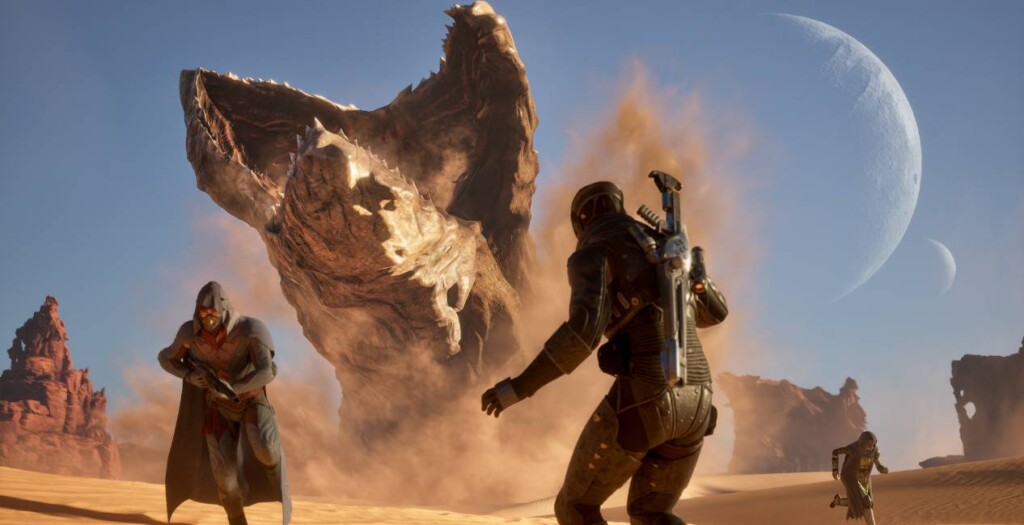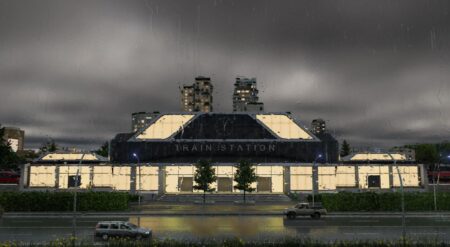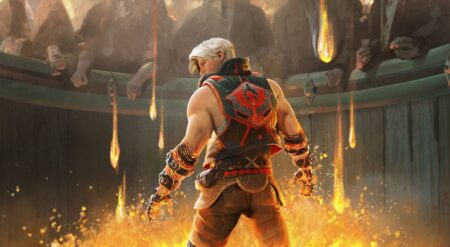At Summer Game Fest, Dune: Awakening debuted gameplay and dove deeper into the upcoming survival MMO’s Deep Desert. While it wasn’t hands-on, the live demo explored the importance of understanding how to travel on Arrakis and showed off combat as well.
We also learned a little more about the alternate timeline that the game exists in and, more importantly, the way those changes impact world events. In order to move Dune: Awakening outside of Paul’s shadow, it needed to move away from him. While working with the Herbert Estate, Funcom tied its alternate history with Lady Jessica’s choice to conceive a child. Only, it’s a daughter instead of Paul.
It’s a change enough to remove Paul from the question but not enough to keep the Atreides off of Arrakis. Additionally, it embeds her even more deeply into the Bene Gesserit, which yields her ability to see the betrayal before it happens and keeps Atriedes from being stomped out. All of which, you can explore more in the Dune: Awakeing Direct 2 Showcase.
But just because it’s taking place in a different timeline doesn’t mean that the game has lost anything that ties it to the lasting legacy of Dune. We got the chance to talk to Matt Woodward, the Social and Economic Director of Dune: Awakening, to discuss player economy, playing on your own, and what he’s most excited for players to explore in the game.
With an MMO-server structure, the main question that has come up the two times I’ve seen a presentation from other press in the audience has always been—in some degree—”What about solo players?” And in this presentation, the Funcom team took time to mention that the game can be played alone, though it does limit some of the choices you have to acquire certain materials. However, when we asked Woodward about the player economy, the market system was the first piece we wanted to discuss.
“[Dune: Awakening] is a more personal game,” Woodward said, “It’s not this big, faceless market. We will have—likely at launch—the Exchange where you can do trading. It’s a bit simpler than the Eve Online system, but it’s still in the same basic world as much as possible. We’re looking to push players to build direct relationships, but we also want to facilitate being able to specialize [their roles]. And it’s through that angle that we’re coming into trading and the Exchange. [It allows players to say] ‘I want to focus on this area of the game. I don’t want to get involved in the PvP. I want to even get as deep as I want to be as an architect. I want to build bases and sell the blueprint stuff based on the Exchange, and then I can use that money to acquire resources that I don’t need to go get myself all this kind of stuff.'”
This approach captures the important loop that solo players can find themselves in. Instead of having to brave the Deep Desert for its unique resources, players can skip PvP and use the Exchange to buy those resources. More importantly, if your specialty isn’t directly dependent on others in the community, like building, it allows solo players to specialize their roles and then use the Exchange to compensate for the costs of resources. However, balancing both aspects, communal exploration and resource gathering, against solo, must be considered.
“[Dune: Awakening] is a more personal game. It’s not this big, faceless market.”
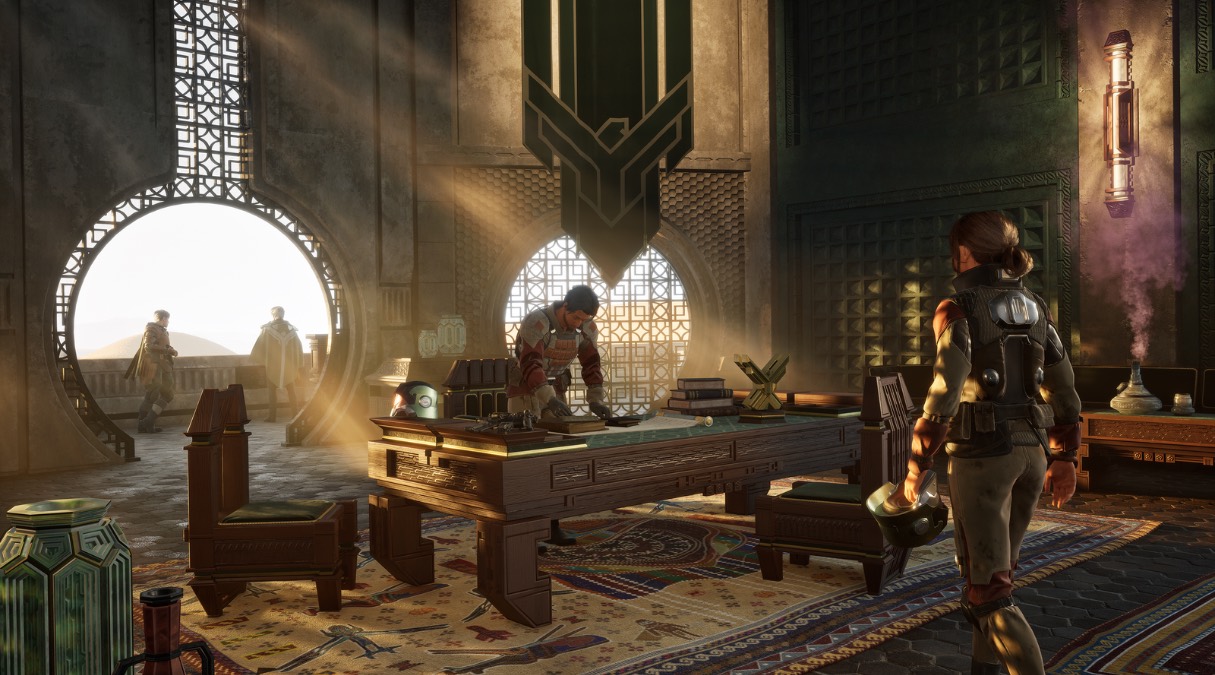
Woodward added, “We’re trying to figure out how to weave that together on this more personal scale. Dune as an IP is one of the things that we’re focusing on. We try to weave in the feudalist aspect of the [IP where we can]. The modern world has a very specific way of working—democracy and capitalism—the big markets and very sort of faceless interactions. Dune as a setting is much more personal. It’s much more feudal. It’s much more about relationships between people. So we’re looking at how we can start weaving back to the player experience of all that. How do we get those more personal connections and that more personal expressions of power.”
With players able to invest in the player economy by selling on the Exchange, using guilds can also impact how the game is played regardless of group size. Woodward said, “At the guild level, we’re hoping to get various integrated guilds, [with] a lot of specialists like working together to do things and then also building connections out from there to more independent players. [We look at] how we can sort of tease [independent players] into the guild ecosystem and the trade ecosystem and support [them] through that. We [are] definitely looking for a lot of people to find their niche in the game or what they want to do, and then find a way to survive based on doing that.”
Allowing that player agency will be key to allowing all players of varying levels of communal interaction to join in. Woodward added, “We want as many as possible players to do what they love doing and minimize the amount they have to do stuff that they don’t want to do.”
Dune: Awakening is also one of the most anticipated games because of the universe it’s a part of. Whether it’s immediately adapting the world to mechanics or making sure that the biomes of the game are as diverse as what we see in Frank Herbert’s Arrakis, it’s all important. But at the same time, the allure of coming to a Dune game means that it has to be approachable in some way to players who haven’t picked up an MMO or a survival game.
When asked about making the game approachable for new players, Woodward said, “We want to open the doors as wide as possible. We know there are a lot of people who are fired up about Dune right now. We’re trying as hard as we can to create an authentic Dune experience—that’s one of our core drivers, one of our core throughlines for [Dune: Awakening]. The thing Joel, our creative director, says a lot is, ‘Make your design fit Dune. Don’t make Dune fit your design.’ This means looking at what is the Arrakis way of doing [something]? And then build that.’
He continued, “Rather than saying, ‘We’re going to build some generic thing, and then we’re going to hang some Dune window dressing on it,’ we’re trying as much as possible to find the real, authentic way of doing it. We’re hoping, in terms of accessibility, that is going to translate to players who are new to gaming. Maybe they don’t know the [gaming] tropes, but they will see things like a skill tree and know how it works on Arrakis. They can think, ‘Oh, well, you know, there’s some people here. I guess I should probably be able to kill them and then suck blood out of their body.’ Yeah, you can do that! We’re hoping that along with tutorials and accessibility and all this kind of stuff, we will give players a way into [the game], even if they’re not familiar with the gaming tropes.”
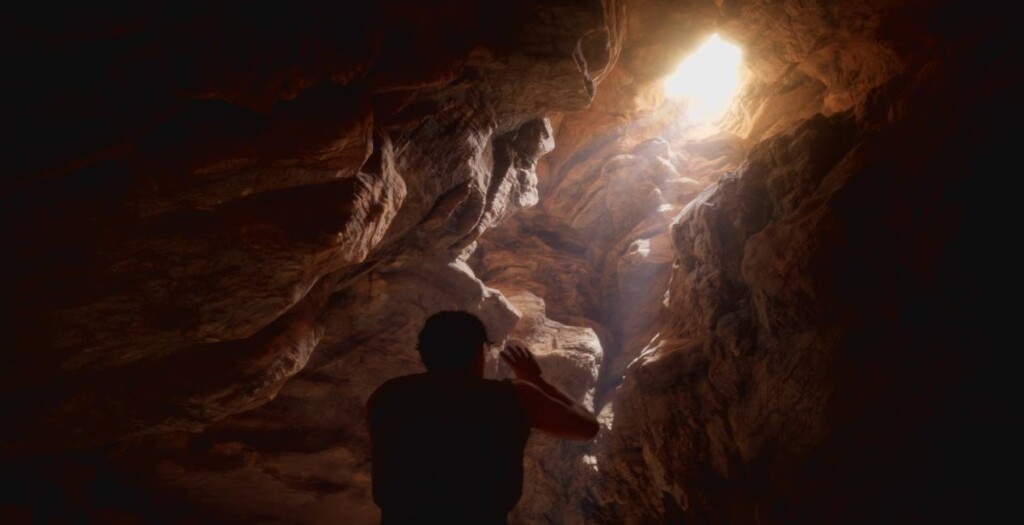
And building those recognizable Dune elements are important. For Woodward, his favorite element that has been adapted isn’t so much about Arrakis, but Dune overall. When asked about his favorite element of adaptation the Funcom team had pulled off, he answered, “It’s not an Arrakis thing as much as a Dune lore/context, thing is stuff that we’re doing with the Holtzman Effect, with suspensors and shields and stuff. Particularly the different dispenser tools and the abilities you get with them—the way they contribute to mobility. It’s a thing that’s there in the books, and you see in the film that they do some lovely things with the second film, where the guys float down, and it looks beautiful. It’s very Villeneuve, but it’s also very kind of slow and static.”
Woodward continued, “And we’re like, you could do much more with that! Just building those tools and then seeing what we could do with them—You’re just climbing something, and be able to climb up and then suspense away, and then grab again. There’s so much just like, neat little stuff that pops out of the tech base and the the experience that Herbert described, and we just extrapolate that out.”
In addition to the tech though, which we got to see during the Summer Game Fest hand-off demo, the biomes of Arrakis also got the spotlight. Making a point to explain that Arrakis isn’t just sand and more sand or rock and more rock, we got to explore more of the world than we saw at PAX East. And, of course, we asked Woodward what his favorite area of Arrakis was.
Honestly? Probably the Graven. It’s such a cool space to play, especially once you have the suspensor, where you can visit in an ornithopter. The NPC bases we have start at the top, and they wind their way down to the very bottom, like coming out in the different ledges. It’s just so much fun to fight down, because it’s not a space this in games, you know? A 300-meter tall staircase of death… From the economy point of view, the resources you get there, the cobalt, I’m just like, put more in there. I want players to keep going back to this region because it’s such a break from the rest of Arrakis. It’s such a cool play space that I’m really like, yeah, that’s my that’s my favorite.”
“Rather than saying, ‘We’re going to build some generic thing, and then we’re going to hang some Dune window dressing on it,’ we’re trying as much as possible to find the real, authentic way of doing it. We’re hoping, in terms of accessibility, that is going to translate to players who are new to gaming.”

But to close, Matt Woodward had to make sure that players know what to expect, that Dune: Awakening isn’t an MMO first. The survival layer isn’t being added onto something, but rather it’s the core of the game experience Funcom is building.
Woodward explained, “When we’re when we’re communicating the direction with the designers, it’s that we’re not making an MMO. We’re making a survival game. If you talk to Jeff the World Director, he’s making a survival space that happens to also be an MMO. We’re not doing the sort of WoW-style ability rotations—we’re a survival game, you shoot people, you use your ability to fly around. It’s Exiles. [We start] from that DNA and that basic concept and that expertise that Funcom has, but then, we made it Dune. It’s not just Exiles-Dune, but rather a Dune game in this mold, and then we blew it outwards. That’s the key to the DNA for me, is it’s a survival game writ large, not an MMO squished down.”
While the server infrastructure of Dune: Awakening is one of the key factors that makes it an MMO, it’s clear that its dedication to bringing Dune to life in a video game and its survival roots are extremely important. After our time seeing the game and talking with the team, it’s clear that we’re only scratching the surface of what’s in store for players.
Dune: Awakening is currently in closed beta with no shared release window.

